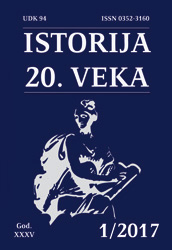Elitno i popularno u jugoslovenskoj filmskoj kulturi 1945-1965.
Elitist and Popular in the Yugoslav Film Culture 1945-1965
Author(s): Rade PantićSubject(s): Sociology of Culture, WW II and following years (1940 - 1949), Post-War period (1950 - 1989), Film / Cinema / Cinematography, Sociology of Art
Published by: Institut za savremenu istoriju, Beograd
Keywords: Elite; popular; film; culture; socialism; Bourdieu
Summary/Abstract: The aim of this article is to try to apply the theory of culture of the French sociologist Pierre Bourdieu, which is based on the distinction between the elitist and the popular, on the domain of the Yugoslav film culture in the period between 1945–1965. Using Bourdieu’s hypothesis that conflicting artistic tastes reflect the class antagonism in the capitalist society we tried to show how aesthetic distinctions function in the case of the film culture of socialist Yugoslavia. The communist project of a classless society proved to be incapable of producing a society devoid of relations of domination and subordination. Socialist realism tried to mask the gap between the majority of population and the party bureaucracy by means of abolishing the division between the elite and the popular culture and by creating a uniform culture for the entire population. The entire social field was thus totalised by one art form. The project of Yugoslav selfmanagement socialism, conditioned by the Cold War situation between the East and the West, failed to develop a distinct cultural model. The project of a classless, self-governing society was hiding the gap between the new governing elite and the rest of the population, the gap that was evident in the existence of the two distinct cultures: the elite culture of socialist aestheticism and the popular culture of the rest of the population. In order to cover this social split the rulling communist party would often start the socalled anti-bureaucratic reforms, changing the cultural paradigms in order to maintain the illusion that the process of permanent self-governing revolution and withering away of the state is in progress. Occasional censorship of both elite and the popular film was to maintain the illusion that Yugoslav society and its culture were on the tracks of their own autochtonous third way road of socialism with a human face. In fact the country was more and more economically and culturally dependent of the Western countries, and the governing elite unwilling to cede power to the ’working people’.
Journal: Istorija 20. veka
- Issue Year: 2017
- Issue No: 1
- Page Range: 103-124
- Page Count: 22
- Language: Serbian

